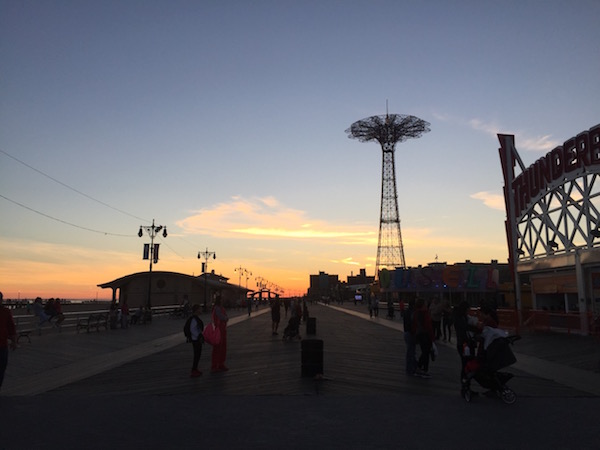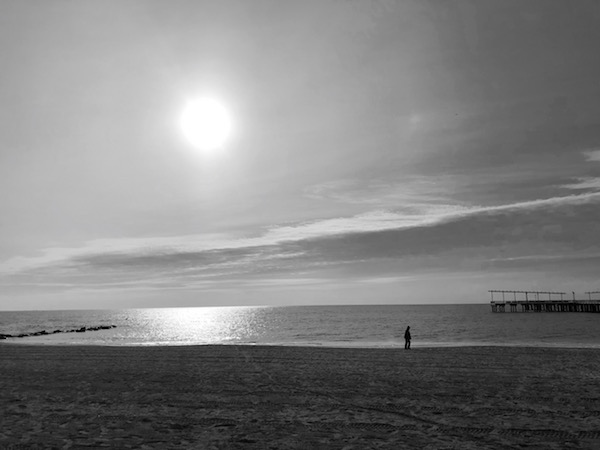
“Writing the Apocalypse” is a weekly series featuring the poems, essays, and recollections of Puma Perl, with subject matter influenced by her experiences as a NYC resident during the COVID-19 pandemic.
The Writer: May His Memory Be Blessed | BY PUMA PERL
Mr. Savage, you’re not dead yet?
And leave my rent-controlled apartment?
I’m living to the age of 99 just to torture you.
An 11th Street studio with an alcove,
heart of the Village, an old walkup,
45 years of Marlboros staining the walls,
not much heat in the winter, and a landlord
who still comes around for the rent.
It was their monthly routine.
Mr. Savage, you’re not dead yet?
I don’t know when the jokes stopped,
maybe with the first wheelchair
or the oxygen tanks or the ambulances.
Definitely with the pandemic.
Death stopped laughing.
Savage was an amiable guy who didn’t much like people
but loved women, whether or not he liked them.
He liked the Thai family in the laundromat next door
and the guys from Agata’s Gourmet Grocery
who delivered his food, and me and Jack Henry
and my kids and a smattering of old friends.
He liked his memories of working at the Cedar Tavern,
referred to his place as his “pad,” Amiri Baraka as “Roi,”
spent his afternoons on the same brown sinking couch
where Cecil Taylor used to sit when he visited,
and the women were all called “Baby” and “Sweetie.”
I remember meeting him one night for dinner.
It was a good hair day, plus boots and leather jacket.
I watched him watching me cross Second Avenue,
his appreciation lighting me up, making me feel
like Sophia Loren in a Patti Smith t-shirt.
We had dinner at the Noodle Shop
and went our own ways to watch the playoffs.
Baseball, a pint of Häagen-Dazs, a book by his side
made for a good night with few regrets.
At times like that I still saw the tall, angry boy,
several years older than I, whom I met
in a Coney Island basement when I was a kid.
He and my best friend were in love, crazy love,
walking miles in the rain singing songs love.
I still picture them on the boardwalk,
backs pressed against the wall,
the “you and me against the world, baby”
already ingrained, shaping their lives forever.
Treating myself, he’d say about a thick steak
and a working girl on New Year’s Eve or his birthday,
a hard-covered copy of the latest Philip Roth,
some Thelonious Monk in the background.
Trapped by the pandemic, his great mind began to slip.
One day he asked me what “enjambment” meant.
For a poet of his stature, it’s like Tom Seaver
forgetting the meaning of a fastball.
(The Yankees were his heart, but he’d root for the Mets.)
As his body rebelled he’d look back and say
all in all it was a good life, wonderful women,
great music, he always worked, and still had
a couple of letters from Bukowski in his drawer.
I’ve been a lucky guy, he’d say, sitting in the stuffy
room in late afternoon light, tubes wrapped around his
desk chair, cigarettes hidden in a file, deep breaths
filled with dust, one flight of stairs impassable without help.
I’ve had a good life, he’d say,
I’m one of the luckiest guys alive.
Luck, he’d repeat, don’t ever underestimate it.
We work and plan and scheme and pray
but dumb providence calls the shots.
Now I am bereft with no one else to mourn,
and I am angry at every life lost
and the nonchalance of the response.
I message Jack, the only person I know who cares
besides the stranger who tracked me down.
Jack produces a stellar poem ten minutes later.
I’m jealous of that poem, choked on words.
More will come, Jack assures me,
You were closer. Different speeds of recognition.
On the Writer’s birthday, the same days as Monk’s,
and two days before my father’s, I dream of both,
embodied by Broadway shows and Allen Ginsburg.
In his memory I wear good black jeans,
a lot of eye make-up and a Veniero’s tee-shirt,
and sit at the computer trying to write
a poem he’d have liked, something true.
He’d have told me straight out if he didn’t,
and he’d have been able to tell me why.
We talked about poetry and Coney Island
and wild cards and escaping Brooklyn,
sun drenched stoops, Monk and Coltrane,
but we never discussed the next stop.
As Jews, we don’t go anywhere
except back to the earth,
we don’t rest in peace,
he’s not looking down at me,
he’s not reading this poem,
he’s not in pain, he’s not joyous,
he’s just gone.
The apartment will be painted,
the brown couch will sink into the street.
I hope his brother saves Bukowski’s letters
and the book of plays signed by Harold Pinter.
So, Mr. Savage, I say, I hear you’re finally dead.
Nah Baby, he answers with the Savage chuckle.
Soul’s still percolating.
And I set the little bastard’s kitchen on fire before I left.
Norman Savage.
The Writer.
May your memory be blessed.
© puma perl, 10/12/20
Puma Perl is a poet and writer, with five solo collections in print. The most recent is Birthdays Before and After (Beyond Baroque Books, 2019.) She is the producer/creator of Puma’s Pandemonium, which brings spoken word together with rock and roll, and she performs regularly with her band Puma Perl and Friends. She’s received three New York Press Association awards in recognition of her journalism, and is the recipient of the 2016 Acker Award in the category of writing. Her most recent books can be found by clicking here.

Chelsea Community News is made possible with the help of our awesome advertisers, and the support of our readers. If you like what you see, please consider taking part in our GoFundMe campaign (click here). To make a direct donation, give feedback, or send a Letter to the Editor, email scott@chelseacommunitynews.com.

Pingback: ทำนามบัตร
Pingback: เค้กสตอเบอรี่
Pingback: pg slot เว็บตรง
Pingback: เว็บพนันเกาหลี
Pingback: dark168
Pingback: Bauc14
Pingback: acquista phentermine online
Pingback: พอตใช้แล้วทิ้ง
Pingback: lizinna pill side effects
Pingback: รับติดตั้งโซล่าเซลล์
Pingback: buy willy wonka chocolate bar
Pingback: ks
Pingback: 무료 다시보기
Pingback: roof skylight
Pingback: Buy Blue Foot magic Mushroom for sale online Australia
Pingback: next
Pingback: เป็นหนองใน
Pingback: pop over to this site
Pingback: live cc shop online
Pingback: adhd testing northern virginia
Pingback: Viper
Pingback: magic mushroom dispensary
Pingback: Explorer
Pingback: Chèque
Pingback: 스포츠토토
Pingback: sbo
Pingback: golden teacher for sale "ohio"
Pingback: this
Pingback: pret perso
Pingback: click here
Pingback: enterprise DevOps
Pingback: amb
Pingback: Anonymous
Pingback: สโบเบ็ต
Pingback: สล็อตวอเลท ไม่มีขั้นต่ำ
Pingback: buy lsd online
Pingback: ücretsiz bulut